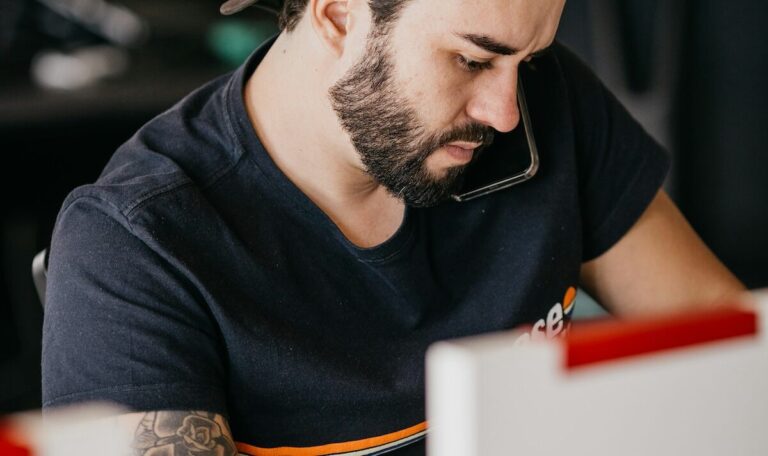
Nope.
While we were tempted to leave a one word answer and walk away from the laptop, we know that some of you prefer a little clarification on this topic. And, we suppose there are some “age related” scenarios that may add risk to getting inked. Without further banter, let’s get to the heart of the matter so that you can make your decision about getting tattooed at an advanced age, whatever that means.
5 Things to Consider When Getting a Tattoo Later in Life
1. What People Think Has Nothing to Do With It
We’ve actually seen people on Reddit, Quora, and other forums ask if getting their first tattoo when over 40 is acceptable. Allow us a big “WTF!?” in response. Look, a tattoo is not a shiny red sports car. It’s not a middle life crisis coping mechanism, so don’t worry about people looking at it is as being that or whether or not you buy into the whole 40 is the new 30, and 50 is the new 40 (etc.) concept. Concerned about a new and visible tattoo having a negative impact on your professional career? Turns out that in 2019 and beyond, it can actually help enhance your personal brand. A great tattoo is a great tattoo, and if it’s a job well done, then others will absolutely appreciate it, not that it matters what they think. Simply put, if you want a tattoo, get one.
2. You’re Less Likely to Regret the Tattoo
The biggest fear around getting a tattoo for anyone, is future regret. Whether 19, 21, or 25 there’s a reasonable chance that if you get a tattoo based on a current interest of pop culture phenomenon you may regret it years after when the enthusiasm has passed. But later in life, you damn well know what you like and what is important to you. You’re not going to regret a tattoo that connects to your culture, family, a passion, or a past experience that has molded you into the person you are today. Heck, you’ll even know if a tattoo regarding your favorite sports team or band will remain relevant and “stick” at that point. You think a Millennial getting a Cardi B tattoo today will look back with the same fondness in ten years from now as you do your Led Zeppelin piece?
3. A Tattoo Can Cover “Wear & Tear”
Excuse the crude “wear and tear” identifier as it applies to age, but it is true that through the years we may collect scars, gain stretch marks, earn an uneven skin tone, and lose elasticity (more on this in item #4 below). A tattoo can be applied to reduce the visible impact of it all. View more on how tattoos can be used to cover up scars and stretch marks and account for muscle loss, along with covering the other aesthetic signs of age on our skin.
4. Working With Skin Elasticity
Around the age of 20 (varies by person and genetics) your skin produces about 1 percent less collagen each year, with dead skin cells building up which contributes to a loss of elasticity. If elasticity has become very poor over time, it can technically be more challenging to pull off a successful tattoo. However, that is an extreme case, and a well seasoned tattooist can work around this. Still, why not start protecting your skin’s elasticity today?
There is a lot you can do to maintain your skin’s elasticity. Nutrition is key, so be sure to consume plenty of antioxidants and consider a natural collagen supplement (upon physician approval) which is all the rage right now and for good reason. Fitness is also important, as it will contribute to lean muscle mass growth at any age, which will also improve skin elasticity.
5. Age Related Conditions That May Increase Risk of Complications
We’d be remiss if we didn’t address some age-related conditions that could impact a successful tattoo. For one, those of a greater advanced age may have a weakened immunity, which will make post-tattoo healing more challenging. A tattoo that typically takes 2 to 3 weeks to heal may instead take 3 to 4 weeks to heal, or longer. In such a case, you need to explicitly follow the after care guidelines provided by your tattooist.
Another concern often associated with older people, is heart health. If you have a heart condition then a tattoo may be a bad idea as undue stress can aggravate your condition. In addition, if you are taking a blood thinner it is a good idea to wait until your prescription is complete and you get a thumbs up from your family doctor. In the end, full disclose (to your tattooist) about age related health concerns and physician approval is key to a successful tattoo. Otherwise, there’s no reason for any healthy individual, be you from the Baby Boomer generation of Generation X, to miss out on getting inked.
Whether you’re 40, 60, or 80 (kudos!) getting your first tattoo later in life can be a great way to celebrate your life, so don’t hesitate any longer. Again, the right tattooist makes all the difference, so schedule a consultation at Adrenaline Studios in Greater Vancouver or Toronto and show that Millennial generation they’ve got nothing on you.


